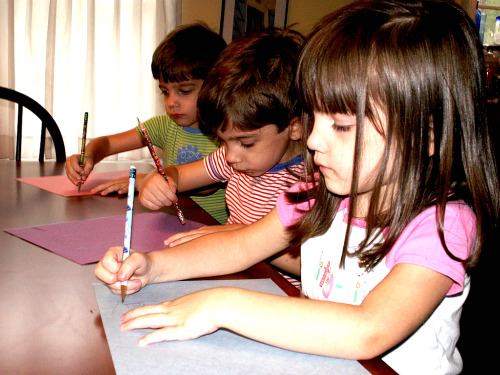You can trust it

Answer: Yes.
It is enough to spend your days exploring the novels you read by talking about what you find there: the plot, the characterizations, the passages that put dialog into quotes, the semicolons, the active verbs, the powerful descriptions, the emotional catharsis that comes once the climax is reached…
It’s enough to copy some of those passages into a little notebook and to then use those passages for dictation. You can trust the process because over time, you’ll see the results show up like magic in the drafts and revisions your kids do all by themselves. The growth may not be evident in one dictation or even by the end of one year. But after a year or two of these practices, you’ll notice that the ease with which your child punctuates resembles the ease with which your toddler suddenly spoke English—complete sentences that seemed to come out of nowhere! The practice (like the tide riding in and out) is a soothing wave of investment each day that eventually pays out in confident transcription. Count on it.
It is enough to watch a movie and talk about it. Writing a review isn’t required, but a high school student may enjoy doing just that! Reading reviews by others and arguing about their points is a great way to grow in one’s own thinking about how evaluations are made. It is good to evaluate and to make comparisons to other evaluators. Movies are always reviewed so they are an easy source of this habit. But it’s just as good to read conflicting opinions about politics, artwork, video games, how to organically garden, and the best practices for playing forward in soccer.
Writing is best learned in the doing, in real life contexts (not just assignments drummed out for some textbook). It’s fabulous to write letters to people you love. It’s important to put a collection of thoughts about a topic into writing because the act of transcribing one’s thoughts has a way of both clarifying the thinking and revealing weaknesses in thought. This exploratory writing is also a wonderful way to codify learning (to keep a record) almost like a journal. Writing lists, and making posters, and drawing comic books with captions, and updating social media sites—these are the opportunities to grow a variety of inner writing voices and must be supported and appreciated. It is enough to consider these part of a robust writing program.
The nurturing that comes with really appreciating a child’s writing risk—reading the writing without judgment but with admiration, discovering the mind life of your child and letting it awe you, becoming aware of your child’s strengths and habits of thought, experiencing the joy of a child’s openness with you—your willingness to share these reactions with your child DOES, in fact, generate the necessary development in writing that your child will need to boldly write in high school and college (that child knows that his or her thoughts have value, weight, significance).
A writing project a month means you value the project (you don’t rush, you don’t treat it like it’s a “task to get done”). It means you are more likely to invest deeply and care about the outcome. It means you are more likely to share the result with an interested audience. It means your child is more likely to learn the skill called revision because there is breathing room around the draft, allowing new thoughts to emerge, new ideas, new ways of expressing the slowly developing perspective the project articulates.
- Learning to write isn’t meant to be a slog through painful assignments bleeding red ink.
- Learning to write has the potential to be as joyful and seamless a process as learning to speak was.
You have the power to ensure that your child gets what he or she needs by investing in who that child is, deeply, now; valuing all forms of communication; seizing opportunities to create real contexts for writing; dialoguing about language in its multifaceted natural contexts you encounter daily; and helping your child get his or her voice to the page or screen as often as is naturally possible.
You can do this. It really is enough.
If you want to toss in a word origins book or a vocabulary growing worksheet or a spelling program or a phonics text—be my guest. You aren’t betraying the principles to try what attracts you. You aren’t wrong for wanting to ensure that your kids “cover the bases.” Who knows? You may have a child who thrives on Latin and Greek roots and you may foster a lifelong love of vocabulary!
The point isn’t to tell you not to do something. My point is to tell you that if this is all you do, you are right in the zone of growing a healthy, free, competent, confident, brave writer.
It’s enough. More than.
Image by peapodsquadmom


















ah. this is so wonderful to hear. as a second-year unschooler, i love this style for writing. the trust in the process is admirable. thank you for articulating it so well!